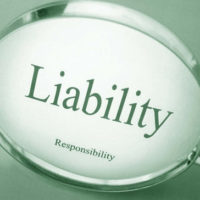Is an Employer Liable for an Employee’s Acts Outside of Work?

Employers in Tennessee are vicariously liable for the negligent acts of their employees. Of course, that does not extend to everything an employee does. The negligent act must occur within the “course and scope” of employment.
Check Dispute Leads to Off-Site Confrontation, Lawsuit
A common example of vicarious liability is a delivery driver who runs a red light and strikes another vehicle. The owner of the delivery vehicle is vicariously liable for its employee’s negligent driving. But if an employee is driving her own car home from work and hits someone, the employer is not responsible, since the accident occurred outside of the scope of employment.
What about an incident that starts in the workplace but ends at an off-site location? The Tennessee Court of Appeals recently examined such a case. Here, a plaintiff claimed he was physically assaulted by a restaurant employee after a misunderstanding over the bill.
The plaintiff and his friend were at the restaurant from about 5:30 a.m. to 6:30 a.m. on the morning in question. The restaurant had a register at the front where customers normally paid. The plaintiff inadvertently left cash on the table and left. A waitress and a dishwasher, mistakenly assuming the plaintiff and his friend had “dined and dashed,” went into the parking lot to confront them.
There were “words” exchanged between the dishwasher and the plaintiff, but no altercation took place in the parking lot. However, after the dishwasher’s shift ended and his girlfriend picked him, they drove to an apartment complex approximately one mile from the restaurant. There, for reasons disputed by the parties, there was a second confrontation between the dishwasher and the plaintiff.
The plaintiff said the dishwasher hit him and then ran him over with his car. He sued the restaurant, arguing it was vicariously liable for the dishwasher’s alleged assault. The courts disagreed. A trial judge granted summary judgment to the restaurant owner, and the Court of Appeals affirmed that decision.
As the trial judge explained, there was no evidence the dishwasher’s alleged actions “were required by his position, job title, job description,” or that he was in any way instructed by his employer to confront the plaintiff. More to the point, the actual assault did not occur on the employer’s property. It took place a mile away after the dishwasher had already clocked out for the night. Given the circumstances, the trial judge (and the Court of Appeals) said there was no way the employer could have “reasonably foreseen” or prevented the dishwasher’s actions.
Speak With a Tennessee Premises Liability Attorney Today
This case should not be taken to mean that an employer is never responsible for criminal acts committed by employees. But it is important for the victim to establish a logical connection between the employee’s actions and the employer’s control or its policies. If a manager had ordered the dishwasher to go into the parking lot and confront the plaintiff, for example, that might have helped establish vicarious liability.
If you have been assaulted on a business premises and have reason to believe the ownership or management is responsible, you should speak with a qualified Knoxville personal injury attorney as soon as possible. Contact Fox, Farley, Willis & Burnette, Attorneys at Law, today to schedule a consultation.
Source:
scholar.google.com/scholar_case?case=13058559432282226995&hl=en&as_sdt=6,47











